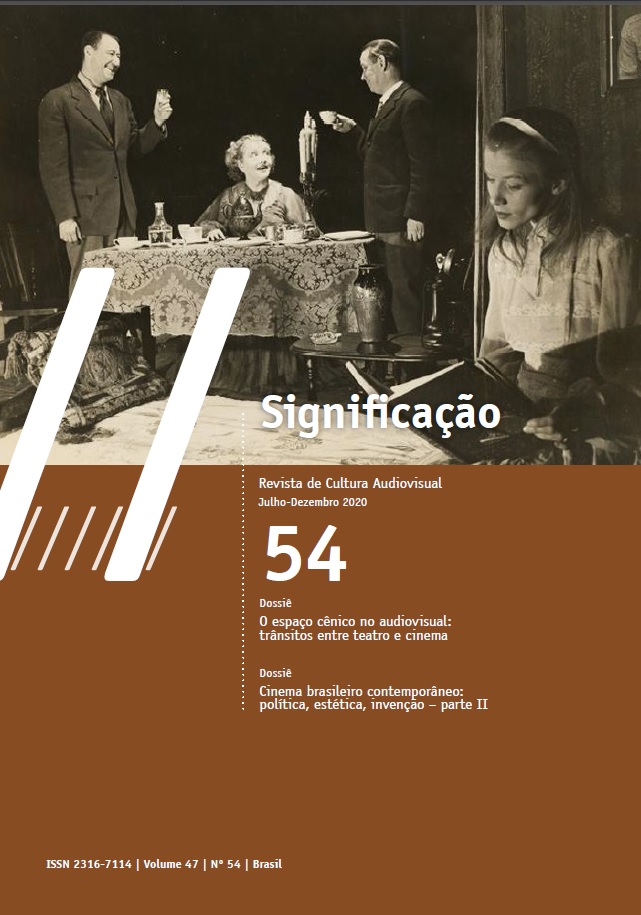To enact lines of force: perceptual dimensions in Goodbye, Dragon Inn
DOI:
https://doi.org/10.11606/issn.2316-7114.sig.2020.166247Keywords:
Contemporary cinema, Tsai Ming-Liang, Percepts, Mise en scène, Slow cinemaAbstract
What is the role of categories such as empty and slowness in contemporary cinema? In Goodbye, Dragon Inn, Tsai Ming-Liang radicalizes the experimentation of elements that point to a negative energy of the image. In this essay, I identify a new status of film image: no longer defined as what organizes the visible in the form of a field, but as the appearance of the visible as a composition of lines of power. For such, I construct the concepts of molar and molecular percepts, which dialogue with the thought of Deleuze and Guattari. I propose to think of acting as a coordination of the forces in emergence in what is visible, therefore debating with contemporary theorists of cinema.
Downloads
References
AUMONT, J. O cinema e a encenação. Lisboa: Texto e Grafia, 2008.
BIRÓ, Y. “The fullness of minimalism”. Rouge, [s.l.], n. 9, 2006. Disponível em: https://bit.ly/2AFd3TP. Acesso em: 15 jun. 2020.
BORDWELL, D. Figuras traçadas na luz: a encenação no cinema. Rio de Janeiro: Papirus, 2008.
COMOLLI, J.-L. Ver e poder: a inocência perdida: cinema, ficção, televisão, documentário. Belo Horizonte: UFMG, 2008.
DELEUZE, G. Cinéma 1: l’image-mouvement. Paris: Minuit, 1983.
DELEUZE, G. Cinéma 2: l’image-temps. Paris: Minuit, 1985.
DELEUZE, G. “Sobre a filosofia”. In: DELEUZE, G. Conversações: 1972-1990. Rio de Janeiro: Editora 34, 1992. p. 169-193.
DELEUZE, G.; GUATTARI, F. L’anti-Oedipe: capitalisme et schizophrénie. Paris: Minuit, 1972.
DELEUZE, G.; GUATTARI, F. O que é a filosofia? Rio de Janeiro: Editora 34, 1992.
DELEUZE, G.; GUATTARI, F. “1933: Micropolítica e segmentaridade”. In: DELEUZE, G.; GUATTARI, F. Mil Platôs: capitalismo e esquizofrenia 2. São Paulo: Editora 34, 2012. v. 3, p. 91-125.
FLANAGAN, M. ‘Slow cinema’: temporality and style in contemporary art and experimental film. 2012. Tese (Doutorado em Inglês) – University of Exeter, Exeter, 2012.
FIANT, A. Pour un cinema contemporain soustractif. Paris: Presses Universitaires de Vincennes, 2014.
LAPOUJADE, D. As existências mínimas. São Paulo: n-1, 2017.
LE BRETON, D. Du silence: essai d'anthropologie. Paris: Métailié, 1997.
LUCA, T. Realism of the senses in world cinema: the experience of physical reality. London: I. B. Tauris, 2014.
LUCA, T. “Slow time, visible cinema: duration, experience and spectatorship”. Cinema Journal, Maryland, v. 56, n. 1, p. 23-42, 2016. p. 163-176.
LUCA, T. “Watching cinema disappear: intermediality and aesthetic experience in Tsai Ming-liang’s Goodbye, Dragon Inn (2003) and Stray Dogs (2013)”. In: GIBBS, J.; PYE, D. (org.). The long take: critical approaches. London: Palgrave, 2017.
MULVEY, L. Death 24x a second: stillness and the moving image. London: Reaktion Books, 2006.
PANOFSKY, E. Significado nas artes visuais. São Paulo: Perspectiva, 1991.
PARENTE, A. “A forma cinema: variações e rupturas”. In: MACIEL, K. (org.). Transcinemas. Rio de Janeiro: Contra Capa, 2009. p. 21-45.
PELBART, P. P. O avesso do niilismo: cartografias do esgotamento. São Paulo: n-1, 2016.
SAFATLE, V. “Entre a diferença e a contradição: Deleuze contra a negatividade”. In: SAFATLE, V. Dar corpo ao impossível: o sentido da dialética a partir de Theodor Adorno. Belo Horizonte: Autêntica, 2019. p. 221-247.
Referências audiovisuais
AI qing wan sui (Viva o amor). Tsai Ming-Liang, Taiwan, 1994.
BU san (Adeus, Dragon Inn). Tsai Ming-Liang, Taiwan, 2003.
DONG (O buraco). Tsai Ming-Liang, Taiwan, 1998.
LONG men kezhan (Dragon Gate Inn). King Hu, Taiwan/China, 1967.
TCHELOVEK s kinoapparatom (Um homem com uma câmera). Dziga Vertov, URSS, 1929.
TIAN bian yi duo yun (O sabor da melancia). Tsai Ming-Liang, Taiwan, 2005.
Downloads
Published
Issue
Section
License
Copyright (c) 2020 Eduardo Brandão Pinto

This work is licensed under a Creative Commons Attribution-NonCommercial 4.0 International License.
Authors who publish in this journal must agree with the following terms:
- Authors keep their copyrights and grant the journal first time publication rights, having their articles simultaneously licensed under the Creative Commons Attribution License, which allows sharing texts with authorship recognition and first publication on this journal for non-commercial purposes.
- Authors are allowed to make additional contracts, for a non-exclusive distribution of the article’s version published on this journal (e.g.: publishing in institutional repositories of articles or as a book chapter), with authorship recognition and first publication on this journal.
















